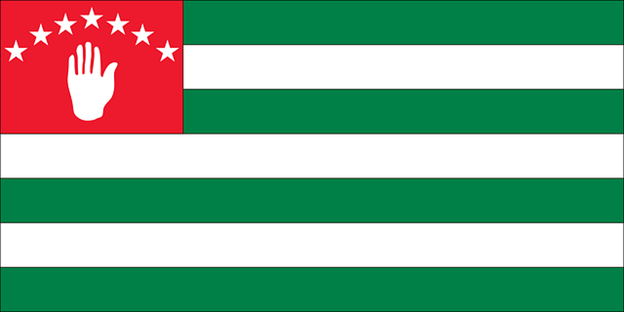Abkhazia, a small Moscow-backed separatist government inside Georgia, is important but unfamiliar to most Americans. It may hold a critical link that helps explain Russia’s territorial ambitions in the coming years. While the world is fixated on the war in the Middle East, Russia has been active in the Transcaucasian region. Abkhazia is less than half the square mileage of New Jersey. Georgia itself is less than one-fourth the size of Nevada. While the Abkhazian territory may be small, its economic and political importance are enormous.
On October 27, the son of one of the most influential members of Russian President Vladimir Putin’s inner circle, Rashid Nurgaliyev, Jr., traveled to Sukhumi, capital of the separatist government in Abkhazia, to sign a public-private partnership agreement with Infrastructure Development (ID). It is a newly established Russian company with plans to restore operations at Babushera Airport. ID is so new that it was not registered in Moscow until weeks after the signing of the deal. Most analysts agree that the firm is simply providing de facto cover for Putin’s next moves in Abkhazia and beyond.
The company’s official owner is Rashid Nurgaliyev, Jr. His father serves as the current deputy secretary of the Russian Security Council and was former deputy secretary of the Ministry of the Interior. The agreement, and the Russians signing it, have frightened local Georgians who believe it is a strong indication Putin may seek to fully annex Abkhazia in the coming year.
The Sukhumi airport, according to Giorgi Menabde of the Jamestown Foundation, has been closed officially for about three decades since the August 1992-September 1993 war. At the time Tbilisi deployed army personnel at the airport and used it to stage the evacuation of the civilian population from Sukhumi after Abkhazian, North Caucasian and Russian troops surrounded it. In July 2019, the International Civil Aviation Organization banned all flights into Sukhumi.
Newly sparked Russian interest in the airport since last June has some questioning why an unspecified “Russian legal entity” has a contract to oversee airport reconstruction and resumption of flights. “The separatist government in Abkhazia agreed to provide the Russian investor with favorable investment terms, including guarantees of ownership and preservation of the agreement’s conditions throughout implementation of the projects,” according to Menabde. In an unprecedented move, the deal includes exemption from property and profit taxes for 25 years. All construction materials and equipment, including aircraft maintenance and fuel are exempted from customs duties. A local publication, Abkhazworld, says that the Russian company will receive “most privileged” status on electricity, paying a tariff rate similar to that of schools and hospitals.
It is significant, as once reopened, the airport will provide Putin with an additional venue for sending in troops and supplies. The revised airport plan reveals new construction for expanded accommodations for officials and “foreign delegations.” It appears Moscow intends to send more “delegations” to the breakaway province. Russia already is increasing the number of its officials in the breakaway province this fall. “The new airport terminal will have a capacity of 1,300 passengers per hour and an estimated cost of reconstruction of 8 billion rubles (approximately $84 million),” says Menabde. The plan’s completion date is set for December 2024. Georgian officials have warned that restoration of the airport is Moscow’s first step to fully annexing the republic after 30 years of occupation, according to a Georgian Business Media story. Vakhtang Kolbaia, former deputy speaker of the Georgian parliament, said in a November 10 interview with Menabde that Russian companies also have been actively buying land in Abkhazia and pushing the separatist government to pass the so-called “apartment bill.” This would permit Russian citizens to buy real estate in Abkhazia.
Putin doesn’t need to formally seize the area, but can de facto incorporate into the Russian Federation, says Kolbaia. Currently, almost 100% of the area’s residents are Russian citizens. Moscow has completed 17 bases in Abkhazia and built a new naval facility at the Port of Ochamchire. The Sukhumi airport is the final piece of the puzzle. In an interview last week, Giorgi Gvbazava, a former chair of the pro-Georgian parliament in Abkhazia, said that despite the international ban, Russia is actively using the airport in illegally annexed Crimea for flights to the peninsula, with some delivering military supplies to Russian forces stationed there.
David Avalishvili, an analyst at Nation.ge, mentioned that possibility in an interview with Menabde saying that “Putin, as always, uses his corrupt officials and oligarchs to carry out his imperialist plans. … In preparing for the occupation of eastern Ukraine and Crimea, Putin actively exploited the interests of Russian oligarchs and his ministers … like Rashid Nurgaliev….” With Putin’s military busy in Ukraine, the economic and financial takeover of Abkhazia may end up the most efficient way for Russia to acquire additional territory and serve as a forward base for future moves further into Central Asia.
Daria Novak served in the U.S. State Dept.
Photo: Pixabay
